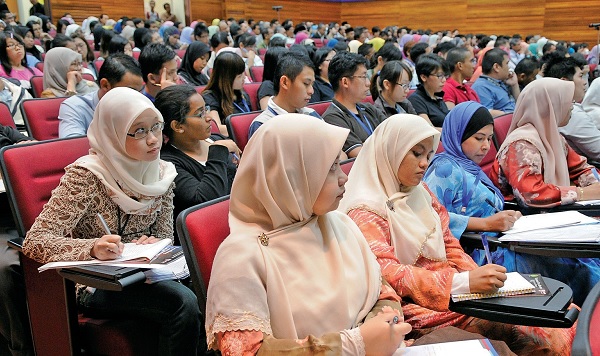A life of bivocational ministry
Visit arrangement/Yiran


▲With financial support from the church in the rear, Ryan bought raw materials and taught local women how to make sewing and handicrafts to help them make a living.
From livelihood skills to concentric praise
Ryan: engaged in business training and entrepreneurship incubation in Chuangqi area
Twenty years ago, God called me to serve as a missionary in a Muslim country. I found that the traditional way of leading Bible studies did not work. Many villagers lack financial resources. When they are hungry, if they just study the Bible and preach, they cannot really help them. So with the support of the church in the rear area, my co-workers and I bought raw materials, taught local women how to make sewing and handicrafts, and helped them learn livelihood skills.
As the relationship developed, I revealed to them that I was a Christian and asked them if they would like to worship and praise the Lord with me. At first, Muslim women said that they could not praise the Lord, but because they are a people who like to sing and dance, they jumped up unconsciously when they heard the music, and gradually began to participate in our worship activities. They were very happy after receiving their salary. During the meal, someone would easily ask, "Why did you just say that God answered your prayers?"
The people here like to feel things with their hearts, so we do not preach theological knowledge to them, but tell stories and let the Holy Spirit touch their hearts. The Lord Jesus often used stories to preach the truth of the kingdom of heaven. In this way, God led us to establish churches in that area, and now missionaries among them have been sent to other countries.
I also have friends who have received a vision to spread the gospel back to Jerusalem through business on the Silk Road. They did not have the capital to start a business, but they had the opportunity to help a restaurant with catering management, hire missionary chefs from the United States, teach local employees how to cook Western food, and train them as disciples. They also conduct business training locally. After the training, the Christians among the trainees naturally begin to preach the gospel to non-Christians.
I also have a friend who was called by God to contact ethnic minorities by managing a youth hostel in the Chuangqi area. He hired local young people as employees, ate and lived with these young people for several months, and taught them how to make beds and clean. A few years ago, there was a fire in the area and the hotel was almost burned down. At this time, other hotels extended an olive branch to his employees and were willing to hire them, but these employees chose to stay and help rebuild the youth hostel without salary... Friends train young people through work, and also help them discover their gifts and talents, better understand themselves, develop themselves, and become people of value to society.
The dual-vocational and business missionary service model is the key to the kingdom of heaven that God has given to the church today to fulfill the Great Commission. However, my past studies in church and seminary were to equip me on how to be a pastor and evangelist. These could not meet my needs for dual-vocational ministry in Muslim countries. I could only learn to follow the leading of the Holy Spirit. Thirteen years ago, with the blessing of the pastor and the support of the church, I returned to China to complete my MBA studies.
Today, I conduct discipleship training by helping local Christians start businesses, manage small loans for business believers, and help them know more about God, glorify God, and become witnesses of Jesus Christ in their business operations.

▲Sharing delicious food is a good way to build relationships. (Image source: Rebekah)
From learning a language to opening your heart
Rebekah, university Chinese teacher
I believed in the Lord while studying in the United States, majoring in linguistics and teaching Chinese as a foreign language. Four months after his baptism, at a youth student camp, I heard the speaker on the stage ask if anyone would be willing to preach the gospel to Muslims along the Silk Road. At that time, I knew that Chinese people were very popular in areas such as the Middle East and Central Asia that were not easy for Western missionaries to enter. During the camp, I was deeply touched when I saw a Chinese sister leading a Muslim girl wearing black veil to learn the Gospel of John in Chinese. Although I didn’t understand God’s call to me at that time, I said, “Lord, I can do this too. I am a Chinese teacher.”
My plan is to study for a Ph.D. in the United States, apply for a university teaching position, get a green card, and teach Chinese and participate in short-term missions during my vacation. But in the end God asked me to give up studying for a doctorate and go to seminary to be equipped. I have had the opportunity to hear missionaries from all over the world share about God’s work in the Muslim world, and I am often moved to tears. After that, God led me step by step and gave me the courage and peace to leave the United States and come to a Muslim country to work as a dual-career missionary.
I teach Chinese at a university, and my career is not only an identity, but also a way to build relationships and show love. Most of the students are Muslims. They are simple and lovely, but they also lose hope because life is not easy and they are confused. They need true light to illuminate their hearts.
A special event burdened me to stay here long term and minister. Before Thanksgiving in 2017, a student suddenly stopped coming to class and couldn't get through on the phone. I was very worried and anxious. God asked me to pray for him using Luke 1:79: “Because of the merciful heart of our God, the morning sun comes down on us from on high to give light to those who sit in darkness and the shadow of death, to lighten our feet. Leading to the road to peace." A few days later, his mother came to me and cried about her child's suicide attempt. I was so sad that I kept crying during the team prayer meeting and asked God what can I do? God said, you go and accompany this student.
When visiting his home, his mother was very comforted and said that the child had been silent in front of his family, but finally smiled when he saw the teacher. I asked the students why they committed suicide? He said, "Teacher, I am anxious because I can't see hope." I shared the gospel with him using the scriptures I prayed before, and also gave him a Russian Christian story book, and said that Saint Jesus (referring to Jesus) is Light guides our lives and brings hope. The student read the story but was afraid to keep the book because he was a Muslim. I continued to accompany him, encourage him, and pray for him. A year later, he received a full scholarship to study as an undergraduate at a university in western China.
The student's suicide makes me feel so indebted, knowing how much these Muslim students need the love of Jesus. At that time, the three-year contract was about to expire, and he was about to decide whether to stay long-term. After the student's accident happened, I told God that I would not leave, but would stay with them for a long time, hoping to guide them to see the hope God has given them.
In Muslim countries, if the work is not done well, just preaching the gospel will not be convincing. When I received evaluations from students that I was a good teacher, I understood that this was an ability given by God to allow me to bear witness to Him in the workplace. The career also provides the stability to develop long-term relationships with local people. When students know that I will stay for a long time, they feel safe and are willing to open their hearts and communicate with me. When they are willing to share openly, there is an opportunity to pray for them. During Eid al-Fitr, my colleagues and I would visit seven or eight student families every day, and then bless and pray for them in the name of Jesus. For Muslims, if you want to influence them, you need long-term companionship.
In economically underdeveloped areas, salaries are very low, and dual-career missionaries need to rely on fundraising to maintain their various financial needs such as living, ministry, reporting, and training. The challenge is even greater when working in a cross-cultural country. Even if you have learned the local language for many years, it is still difficult to integrate into the local circle of colleagues. On the one hand, dual-career missionaries need to spend more time and energy on equipping and learning professional skills and biblical truths; on the other hand, they also need more time and energy to face the busy and high-pressure field service.
Although there are many challenges, I am grateful to be a Chinese teacher serving Muslim students. This is a glorious calling.

▲A sincere teaching attitude can reveal the beauty of God and attract students to open their hearts to the teacher.
From cross-cultural learning to cross-cultural service
Silin, English teacher
I immigrated to the United States from Taiwan with my parents when I was ten years old, and I believed in the Lord when I was in high school. While attending the Urbana Mission Conference in college, I received God’s call and decided to serve as an overseas missionary. But it wasn’t until I was 40 that I turned back, surrendered to God, and was willing to give myself completely. I once thought about whether to go to seminary to prepare for full-time preaching. As I was waiting, God revealed to me step by step that He wanted me to use my bilingual and bicultural background to serve Him as an English teacher. When I was nearly 50 years old, He opened the door for me to enter a prestigious school and complete the master's degree in Teaching English as a Foreign Language (TESOL).

▲English teaching became Silin’s starting point for contacting students in missionary areas.
I have taught English to atheist and Muslim students in China and the United States. Most of the teaching environments did not allow sharing the gospel, but the students were eager to learn English and liked to be close to me. I understand that imparting knowledge and solving doubts with love and a sincere attitude is the way to serve and glorify God. With the help of English teaching, we also hope to help students establish a correct outlook on life, world view and values, and train them to become people who contribute to society.
Compared with full-time missions, dual-vocational missions have greater challenges. They must demonstrate the unity of words and deeds in work and faith, and live out the gospel in the workplace to bear witness to God. When students cheat or are obsessed with video games, which affects their studies, I need to be both loving and righteous, and seek God’s wisdom through prayer. 1 Peter 2:9 says that we are both “God’s people” and “a royal priesthood” to bring people into the presence of God. By teaching English and serving God, I am a priest in the workplace, cultivating students with love, hoping that they will succeed in their studies, discover God's call in their lives, and prepare to serve God through work in the future.
My wife and I have participated in campus missions in China and also participated in ministry to Chinese students in the United States. Students are teachable and malleable. Changing today’s campus is to cultivate the leaders of the Kingdom of God tomorrow. When we accepted the call of cross-cultural missions, we understood that not only should we “go and make disciples of all nations”, but we should also help young students have a vision and sense of mission for cross-cultural missions. Young people have strong ability to adapt to cross-cultural environments, and they will be the new force in cross-cultural missionary work in the future.
In fact, God allowed me to study and live in a cross-cultural environment when I was a teenager, preparing me to become a cross-cultural missionary in the future. Today, a large number of international students come to North America to study and experience the cross-cultural environment. I believe that in five or ten years, some of them will become cross-cultural dual-career missionaries and go to the 10-40 years in a professional capacity. window areas, helping local economic and educational development, transforming workplaces and communities, and fulfilling the great mission through work.
At a summer camp for Chinese students hosted by a Christian school, the Holy Spirit moved me to temporarily play the missionary documentary "Love in China" to the students who were resting in the hall. The students were deeply moved when they saw that so many Western missionaries left their hometowns and went to China to open hospitals and schools, serving God professionally and bringing the love of Jesus to millions of Chinese people. We also encourage them to work in countries on the Silk Road after graduation, challenge their lives and bless people in foreign countries because of the love of Jesus.
When my wife and I were on the mission field in a Muslim country, we saw God’s miraculous works in this land, and we also saw that there are still a large number of unreached people who have not yet heard of Jesus Christ. Today, on the frontline of Muslim missions, the traditional missionary model is limited. There is an urgent need for seminaries, institutions and churches to rethink the strategies and equipment of dual-vocational missions in order to meet the new challenges of world missions. Let us encourage the younger generation to live out their faith, participate in global missions, and embark on a life of dual-vocational ministry.
Yiran, from China, living in the United States, currently serving in the Chuangqi area, and actively promoting cross-cultural missions through writing.
